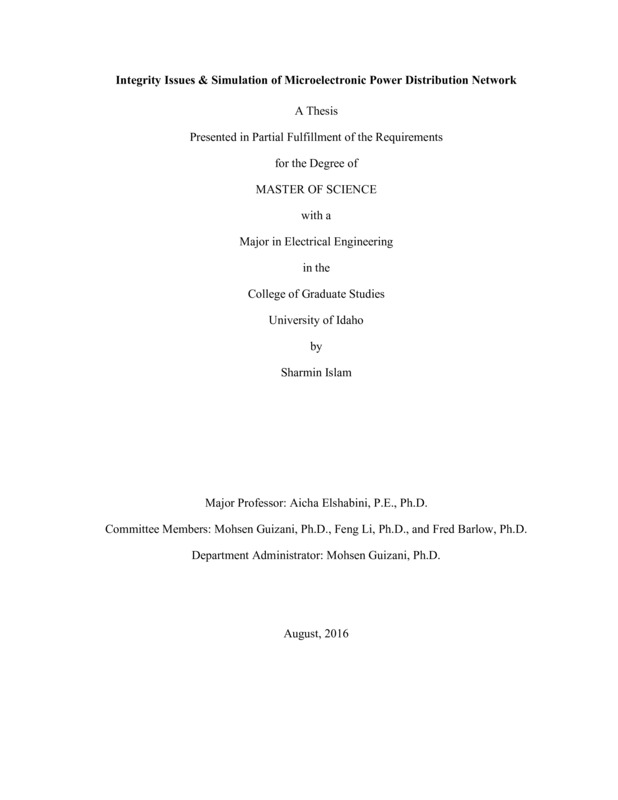Integrity Issues & Simulation of Microelectronic Power Distribution Network
Islam, Sharmin. (2016). Integrity Issues & Simulation of Microelectronic Power Distribution Network. Theses and Dissertations Collection, University of Idaho Library Digital Collections. https://www.lib.uidaho.edu/digital/etd/items/islam_idaho_0089n_10824.html
- Title:
- Integrity Issues & Simulation of Microelectronic Power Distribution Network
- Author:
- Islam, Sharmin
- Date:
- 2016
- Keywords:
- Ansys HFSS Differential S parameters Power Distribution Network (PDN) Power Integrity Signal Integrity Z parameters
- Program:
- Electrical and Computer Engineering
- Subject Category:
- Electrical engineering
- Abstract:
-
High speed, high densities and system-in-packages play an important role in microelectronics. Taking advantage of process technology improvements, semiconductor vendors are increasing device densities which increases demand on total current delivery. In this case, electrical integrity which includes signal integrity, power integrity and electromagnetic interference, is a major issue. Signal integrity assures acceptable quality of signals within the system, such as transmission line effects, cross talk, impedance mismatch. Power integrity assures acceptable quality of power delivery within the system, such as voltage drop, high impedance, parasitic via inductances, noise coupling are the most significant challenges for a semiconductor device designer. The increasingly rigorous noise requirements and timing issues require more predictive signal integrity and power integrity analysis to meet the market demand.
A robust power distribution network (PDN) is fundamental to the enhanced performance and reliable operation of high-speed and dense microelectronics. The designer must consider proper fabrication and advanced packaging system along with the design techniques to address signal and power integrity issues. Efficient design of the microelectronic system is a multi-variate optimization problem across numerous parameters such as, voltage tolerance, AC current demand, impedance profiles, and package parasitics. In addition, simulation is important to achieve the optimal solution. Simulation can reduce the cost and production time significantly, especially for new product development. Therefore, signal and power integrity simulation is becoming an integral and essential part of the package design and development flow.
In this thesis, three PCB boards included (1) no trace, (2) with trace, and (3) with trace and vias, were designed to characterize the simplest versions of power distribution network (PDN) using differential S parameters. Since PDNs can be extremely complex, that requires advanced levels of laboratory setups and high performance computational capabilities which were not in the scope of this work. These three designs were fabricated and measured using Network Analyzer N5225A. The three PDN designs were modeled and simulations were conducted using Ansys HFSS. Ansys HFSS is a full wave electromagnetic field simulator for 3D volumetric modeling of passive devices. Ansys HFSS utilizes adaptive iterative solution process using finite element method and provides highly accurate solutions. From the simulations, S parameters and Z parameters of the three PDN models were obtained and differential S parameters were calculated. The results obtained from the simulations were compared with the measured S parameters, Z parameters and differential S parameters. The simulation and measurement data of the three models agreed well up to 1.5 GHz. But with the increasing frequency over 1.5 GHz, a discrepancy between the simulation and measurement data were observed. This may be due to calibration issues with the increasing frequency during measurements. Since the simulation was validated with the measurement data up to 1.5 GHz, these simulation models can further be used with added complex features such as VRM, decoupling capacitors and other elements. and can predict the more complex signal and power integrity characteristics.
- Description:
- masters, M.S., Electrical and Computer Engineering -- University of Idaho - College of Graduate Studies, 2016
- Major Professor:
- Elshabini, Aicha
- Committee:
- Li, Feng; Barlow, Fred; Guizani, Mohsen
- Defense Date:
- 2016
- Identifier:
- Islam_idaho_0089N_10824
- Type:
- Text
- Format Original:
- Format:
- application/pdf
- Rights:
- In Copyright - Educational Use Permitted. For more information, please contact University of Idaho Library Special Collections and Archives Department at libspec@uidaho.edu.
- Standardized Rights:
- http://rightsstatements.org/vocab/InC-EDU/1.0/

